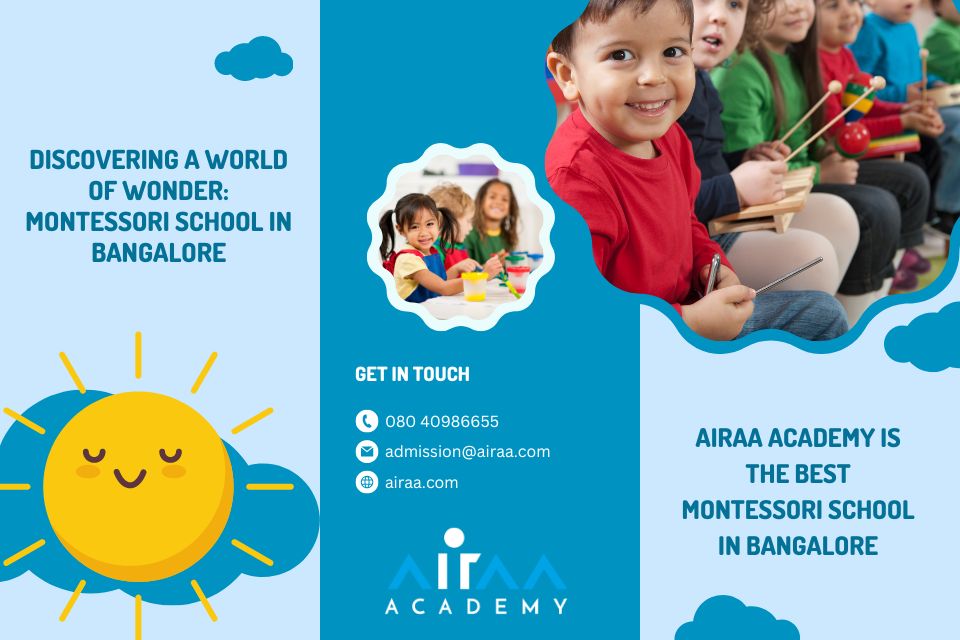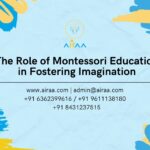What a blessing it is to realize that the entire universe serves as a learner’s classroom. The information becomes limitless when a learner’s classroom learning extends outside the school’s four walls. Montessori education is all about this.
Leaners who grow up in a Montessori environment learn to appreciate the beauty of various cultures and traditions and consider themselves as global citizens. They frequently consider life to be their classroom. And using this strategy, the Montessori Method develops in youngsters a wide range of cognitive abilities, including creative thinking, problem-solving abilities, and a drive to learn and push oneself. If you are looking for the best elementary Montessori in South Bangalore, you have come to the right place.
What is Cognitive Development?
Leaners experience tremendous growth and development in all four developmental areas in the first five years of life. These include physical motor, linguistic, communication, cognitive, social and emotional.
The ability of leaners to think, explore, and have problem-solving skills is referred to as cognitive development. The acquisition of knowledge, skills, problem-solving abilities, and dispositions all help leaners take into account and comprehend their surroundings. The growth of the brain is an integral part of cognitive development.
This groundwork is crucial for the learner’s success in school and later in life. The ability to discriminate sounds at six months of life, for instance, has been linked to learner’s ability to learn to read at ages four and five.
What is The Montessori Theory?
The Montessori Method was created by Maria Montessori, who believed that education should be able to meet the needs and interests of each learner. Maria Montessori’s Theory places a strong emphasis on self-paced learning. It is based on the idea that learners are inherently interested and capable of learning on their own.
Maria Montessori developed educational tools that turn abstract concepts into tangible forms using actual activities and things because she observed that learning and development go hand in hand. Leaners learn by witnessing and interacting with these items and classmates in multi-age classrooms. They can focus and solve problems better when they have long, uninterrupted hours.
How do Montessori Education Foster Cognitive Skills?
Dr. Maria Montessori designed educational resources and a setting for learning that nurtured learner’s natural curiosity. Long engagement encourage exploration and enable the learners to think more deeply about how to solve the issue. The learners are allowed to choose their own learning materials or activities from the shelf. In other words, a Montessori curriculum has a lot of these tools and activities that promote cognitive growth.
To promote cognitive growth, the learner must participate in routine pursuits and interactions. Here are 5 elements of the Montessori curriculum that are crucial for promoting learner’s cognitive development.
The Prepared Environment:
The environment is internalized and the surrounding materials are explored with the aid of a Montessori education. When given resources are appropriate for their skill development in a prepared setting, which is crucial for cognitive development, learners are driven to learn. For instance, a set of constructive triangles is offered that can be used to create a variety of shapes.
Critical Thinking:
Books and practical learning tools are provided in the Montessori curriculum to promote critical thinking. Leaners are given age-appropriate books and activities by facilitators that help them build their vocabulary and critical thinking skills. The development of the learner’s memory, focus, and problem-solving abilities is assisted by sensory and real-world experiences. A youngster usually develops more sophisticated critical thinking, which in turn encourages cognitive growth in them.
Interactions and Communication:
Leaners in mixed-age groups are encouraged to play cooperatively or in imaginative roles as part of the Montessori education. As they converse, they help one another learn, and tutor one another. It is a smooth way to build excellent interactional skills. The older youngsters assist the younger ones with their work, while the latter brush up on their knowledge and hone leadership skills. This aims to improve learner’s self-construction and fosters brain growth.
Problem-solving ability:
Ability to organize thoughts and solve issues while learning new ideas at their own pace is promoted in a Montessori environment. The lengthy hours give plenty of opportunity to ponder and learn the idea. Leaners develop their ability to cooperate, follow instructions, and formulate plans. Additionally, leaners are encouraged to acknowledge and fix their own errors. Such skills lay the groundwork for the development of problem-solving, ethical decision-making, and analytical ability, all of which are a part of cognitive development.
Concentration and Focus:
Montessori places a strong emphasis on cooperating with others, which helps the learner focus as they acquire new abilities. A learner’s focus and concentration can be improved with the aid of resource materials including transferring activities, color sorting activities, threading and sewing, and many other activities.
Best Elementary Montessori in South Bangalore:
At Airaa Montessori academy, we make sure to provide freedom, structure, order, exposure to the environment, and a calm setting to our learners that are necessary for intellectual development. We provide leaners with top-notch education and care as a certified Montessori school. We adopt Maria Montessori’s educational philosophy, practices, and curriculum because we believe the changes we make will endure a lifetime and help learners become well-rounded adults. So, if you are looking for Montessori School in South Bangalore or Best Elementary Montessori in South Bangalore, then let’s get in touch. Your child will gain independence, a feeling of empathy and social justice, and a lifelong love of learning through a Montessori education at Airaa Academy.






